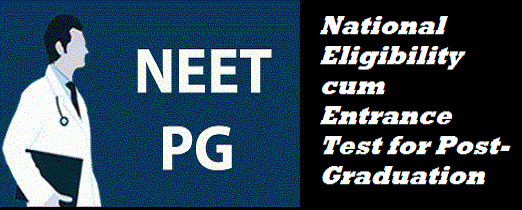NBE conducts the exam, NEET PG 2021 annually. This exam is the path to get admission for the post-graduate course of medicine in Indian colleges. NEET PG is the only exam for post-graduation in India. Apart from NEET MDS (which is another exam conducted by NBE, but for dental colleges). It is a national level exam comprising of 300 MCQs. 210 minutes for solving the questions. Online mode for exam conduct. The article below is a complete guide to NEET PG2021. From filling the forms to preparing for the exam, we bring all of it just for you!
IMPORTANT DATES
On the 10th of January, 2021, NEET PG-2021 should be held. The application process begins by the first week of November and the forms will be open until the third week of November. The admit cards will release by the last week of December. The tentative dates for the results will be in the last week of January. Precisely,
| Registration forms out | The first week of November |
| Registration stops | Last week of November |
| Admit cards released | Last week of December |
| Exam to be held on | 10th January 2021 |
| Results out | Last week of January |
All of the above will be available at https://nbe.edu.in
APPLICATION FORMS
The registration of candidates begins in the first week of November. There is no provision to fill the application form in offline mode, i.e. the forms can only be filled in offline mode. The forms should be filled out by the third week of November since that is when they will stop accepting further responses. The forms would also require uploading the scanned images of passport-sized picture and the signature of the appearing candidate.
The fee for applying is ₹ 2750/- for SC/ST/PWD candidates and ₹3750/- for general category students. The fees can be paid through Indian Credit or Debit cards or via internet banking.
Read More: Direct MD MS ADMISSION 2020 | NEET PG Admission 2020
NEET PG 2021 SYLLABUS
The syllabus of NEET PG 2021 is rather vast. The main topics along with their syllabus is listed below:
- Pathology: Introduction to Pathology, Cell Injury, Amyloidosis and Calcification, Inflammation and Repair, Circulatory Disturbances, Growth Disturbances and Neoplasia, Immunopathology, Infectious Diseases, Miscellaneous Disorders, Cardiovascular Pathology, Respiratory Pathology, Urinary Tract Pathology, Pathology of the Gastro-Intestinal Tract, Hematopathology, Liver and Biliary Tract Pathology, Lymphoreticular System, Reproductive System, Osteopathology, Endocrine Pathology, Neuropathology.
- Anatomy: Gross Anatomy, Osteology, Muscular System, Arthrology, Cardio Vascular System, Respiratory System, Digestive System, Genito-Urinary System, Endocrine System and Individual Endocrine Glands, Nervous System and its components, Special Sensory Organs, Lymphatic System, Surface Anatomy, Cross Sectional Anatomy Cross sections of thorax, abdomen and pelvis to understand the interrelationship of organs and structures, Microanatomy.
- Physiology: General Physiology, Nerve–Muscle, Blood, Respiratory System, Cardiovascular System, Gastrointestinal System, Nutrition, Environmental Physiology, Reproduction, Kidney, Neurophysiology, Sensory system, Motor system, Visceral and motivational system, EEG, sleep and higher nervous functions, Special Senses, Yoga
- Biochemistry: Biological cell, Biomolecules, Enzymes, Metabolic pathways, their regulation and metabolic interrelationships, Carbohydrate metabolism, metabolism of Amino acid, Lipid, TCA cycle and biological oxidation, proteinoids. Regulation of the metabolic pathways, Food assimilation and nutrition, Hormones, Molecular Biology, pH, Buffer, physiological buffer systems, Immunology, Environmental biochemistry, cancer and cancer makers
- Pharmacology: General Pharmacology, Autonomic nervous system & Peripheral nervous system, Central nervous system, Autacoids, Cardiovascular, Gastrointestinal and respiratory system, Hormones, Chemotherapy, Immunomodulators, Drug therapy of glaucoma and cataract, Treatment of poisoning
- Microbiology: Introduction to Microbiology, Bacteriology, parasitology, Virology and Mycology, Bacterial Staining and Cultivation, Common Tests for Bacterial identification, Laboratory Diagnosis of Viral Infection, Common Laboratory Methods for Diagnosis of Fungal Infections, Collection of Transport of Samples, Host-Parasite relationship. Bacterial AND Viral Genetics, Immunity to infection, Immunodiagnostic, Vaccines, Sterilization and disinfection, Bacteriology of water and air, Microorganisms associated with gastrointestinal infections (Bacteria, parasites, viruses and fungi), . Gastrointestinal infections caused by parasites.
- Forensic Medicine: Forensic Pathology, Clinical forensic medicine, Medical Jurisprudence, Forensic Psychiatry, Forensic Sciences, General, clinical, environmental and analytical toxicology.
- Psychiatry: Behavioral Sciences, Cognitive process and memory, Thinking and problem solving, Intelligence: General concepts and techniques for assessment, Personality (Principles of Personality development) and objective testing of Personality, Introduction and classification of Psychiatric disorder, Aetiology of Psychiatric disorders, Drug and Alcohol dependence, Personality disorders, Counselling and psychological therapies, Psychological testing.
- Obstetrics and Gynecology: Basic Sciences-Normal & abnormal development, structure and function of female & male urogenital systems, endocrinology of the reproductive system, Gametogenesis, fertilization, Role of hormones in Obstetrics & Gynecology, Humoral and cellular immunology in Obstetrics & Gynecology, Physiology of normal pregnancy, diagnosis of pregnancy, Anemia in Pregnancy, Carcinoma Cervix, epidemiology, staging diagnostic procedure, treatment of Menopause and related problems, Contraception, Neonatology, and Recent Advances.
- Pediatrics: Contraception, Neonatology, and Recent Advances, Growth and development, Nutrition, Immunization, Infectious diseases, Hematology, Respiratory system, Gastro-Intestinal Tract, Central Nervous System. Cardiovascular system, Genito-Urinary System, Neonatology, Pediatrics Emergencies, Fluid-Electrolyte, Genetics, Behavioral Problems, Pediatrics Surgical Problems, Therapeutics.
- Opthalmology: Anatomy and development of the eye, Clinical methods in ophthalmology, Optics and refraction, Disease of the conjunctiva, Disease of the cornea, Disease of the sclera, Disease of the Uveal tract, lens, Glaucoma, vitreous, Retina, Vision and neuro-ophthalmology, Strabismus and Nystagmus, Disease of the lids. The disease of the lacrimal apparatus, Disease of the orbit, Ocular injuries, Basic principles of ocular therapy, Systemic ophthalmology, Community Ophthalmology, Miscellaneous Topics.
- Radiodiagnosis and Radiotherapy: Identify and diagnose all aspects of Emergency Room Radiology, Basic hazards and precautions in Radio-diagnostic practices, the basic need of various radio-diagnostic tools in medical practice, learn about various imaging techniques, including isotopes C.T., Ultrasound, M.R.I., and D.S.A., know about radioactive isotopes and their physical properties, identify symptoms and signs of various cancers and their steps of investigations and management
- Surgery, ENT, Orthopedics, Anesthesia: Diagnose with reasonable accuracy all surgical illnesses including emergencies, Surgical knowledge of head, spine, chest abdominal, and pelvic injury, know about various surgical techniques such as venesection, tracheostomy and endotracheal intubation, circumcision, biopsy of surface tumors. Comprehensive diagnosis of common Ear, Nose and Throat (ENT) diseases including the emergencies and malignant neoplasm of the head and neck, use of head mirror, otoscope and indirect laryngoscopy, possess knowledge of various ENT rehabilitative programmes. Therapeutic Orthopedics, knowledge on Splinting, Manual reduction of common fractures and dislocations, recognize metabolic bone diseases. Acquire knowledge on pre-anesthetic checkup and pre-anesthetic medications; simple general anesthetic procedures, anesthetic records, cardio-pulmonary brain resuscitation (C.P.B.R.) methods.
- Medicine Dermatology And Venereology: Common clinical disorders, drug therapeutics, diagnostic and investigative procedures. Disorders of Pigmentation, Allergic disorders, Papulosquamous disorders, Papule vesicular disorders. Leprosy, Fungal infections, Scabies, Pediculosis, STD, Malignant Skin disease.
- Social and Preventive Medicine: History of Public Health, Concepts in Public Health, Epidemiology and Research Methodology, Epidemiology of Specific Diseases, Entomology ,Biostatistics , Health planning and Public Health Administration , Nutrition, Environmental Health, Demography, Mental Health and Education Technology , Environmental Sanitation , Demography and Family Planning , Mental Health, Recent Advancements in Public Health and Miscellaneous topics , Sociology ,School, Occupational, Urban Health.
Read More: NEET PG 2020 Cut Off : Expected and Previous Year Category Wise Cut Off
EXAM PATTERN
Preparing for an exam majorly includes knowing the exam pattern. You get an edge above others when you can expect a certain format in your exam. This pattern will help you segregate into which topics are more important than others.
| SUBJECT | NUMBER OF QUESTIONS |
| Anatomy | 15 |
| Physiology | 15 |
| Biochemistry | 15 |
| Pharmacology | 20 |
| Microbiology | 20 |
| Pathology | 25 |
| Forensic Medicine | 10 |
| Social and Preventive Medicine | 25 |
| Medicine Dermatology and Venereology | 37 |
| Surgery, ENT, Orthopedics, Anesthesia | 46 |
| Radiodiagnosis and Radiotherapy | 12 |
| Obstetrics and Gynecology | 25 |
| Pediatrics | 15 |
| Opthalmology | 10 |
| Psychiatry | 10 |
| TOTAL | 300 |
NEET PG ELIGIBILITY
Each course obviously requires certain eligibility. The prerequisites to give NEET PG2021 are listed below. All of them are mandatory and not having even one of them fulfilled won’t be counted as eligible.
- Qualification: Candidates should have an MBBS degree or a provisional pass certificate. The certificate should be approved by the Medical Council of India (MCI).
- Registration: The candidate should have a permanent registration certificate of the MBBS degree.
- Experience: The applicant should have at least a year of internship experience by or before 31st March 2021.
ACING NEET PG 2021
NEET PG 2021 has a very vast syllabus and the questions are not known for being straight forward and easy. The preparation should be thorough and wholesome. Here are a few tips to help you prepare and clear NEET PG2021.
- Planned Studying: Studying is way more effective when you do it systematically. Making a proper study plan or a timetable will give a sense of achievement and confidence at the end of every day.
- Study Material: NEET is a national level exam and it is not known for being an easy one. You will have to level up.
- Note making: Whenever you study, make sure you make notes and efficient ones at that. The notes should be such that you can visit them at the time of the exam and they provide a quick recap.
- Difficult topics first: The logic behind doing the difficult topics first is so that you can revise them before the exam. If you start doing the crucial and difficult topics right before the exam would risk a blackout.
- Practice: I think this is the most important part of your preparation. You can study all you want, but none of it would be of use if you don’t learn its applications. Practicing more and more would also increase your confidence. You should do as many mock test/sample papers as you can.
- Sleep: I know it may seem like cracking NEET would lead to sleepless nights, but your brain needs to work efficiently when you study. Sleep is like the fuel to your brain and without proper sleep, studying would be useless. Students should have at least 8 hours of sleep every night.
FAQ’s:
Ans.-No, the exam will be conducted only in online mode.
Ans.- The questions will be MCQ type i.e. it will be an objective exam.
Ans.- Yes. A reward of 4 marks is given for every correct answer and a penalty of 1 mark for every incorrect answer. (+4,-1).
Ans.- The exam is for hours and 30 minutes, i.e. a total of 210 minutes.







